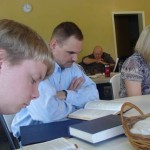If there is not ONLY one teacher, then no one is teaching
Arthur at “The Voice of One Crying Out in Suburbia” has written a very good post called “How can anyone learn if they are interacting?”
In the post, Arthur is responding to a critique of “cell groups” that do not have a single person teaching for the entire group. Arthur rightly points out that interaction and discussion are not dangerous, but are actually necessary for the growth of the church.
In his final two paragraphs, he concludes:
The church needs to stop being afraid of the laity, of open discussion, of questions. The church too often functions like the old Soviet Union when it comes to controlling the message. The result is a laity that is ill informed and immature. Guess what. They will never stop being immature if they are constantly coddled and spoon fed teaching. Pastors/elders need to remember that while they are called to watch over the church and be watchful for wolves, they are also called to equip the entire Body for ministry and mature faith.
Elders, the church is not a seething mass of potential heretics to be afeerd of. The are your brothers and sisters in Christ. The best defense against heresy is not to control the message, it is to equip and empower the entire Body. By definition a mature Christian is not a heretic so lets stop treating our brothers and sisters as if they are guilty of heresy until proven otherwise. (Emphasis in original)
Now, I think that Arthur makes a very good point. I think his point can be backed up by the examples and commands of Scripture. Christians do not grow in maturity by listening to someone else teach/preach.
However, I want to take this a step further. In the original post (the post critiqued by Arthur), the blogger writes, “In the typical cell group, no one actually teaches. Rather, one person will moderate a conversation.” Notice the assumption: if no one person is doing all the teaching, then no one is teaching, and in fact, no teaching is taking place.
In fact, during a conversation/discussion, it is possible that EVERYONE is teaching. And, beyond that, there is the possibility that MORE people are learning during a discussion than during a lecture.
Sometimes, those questions and opinions and observations that people add to a conversation/discussion are the most important lesson being taught.
I will add one more point here… regardless of who something is taught with words, whether it is though discussion or through lecture, the best lessons are taught and learned through living examples. If we are not sharing our lives with one another, then any type of teaching (lecture or discussion) will fall far short of actually helping someone mature in Jesus Christ.
Defining what it means to be a missionary
Two bloggers are examining the term “missionary” and trying to put it into its scriptural context. This is difficult to do, since the term is not really a scriptural term. But, their both doing a good job getting people to think about the term “missionary.”
Wes at “a mission-driven life” wrote a post called “Missionary Calling 1.01” which is a follow-up of his previous post “What is God’s calling?”
While Wes’ discussion begins with a consideration of the modern concept of “calling” (which follows from his previous post), he turns to another important topic:
The only thing that I want to add to the whole discussion on missionary calling is that I think we need to move beyond the sole focus on individuals, qua individuals, as the primary agents of mission/s. I believe scripture gives us an ecclesial emphasis in mission. Jesus sends the church. As members of a unified and maturing body, individuals gifted and set apart for service are sent in plural teams, as agents of the church. You see this repeatedly throughout the NT.
Also, Miguel at “Pathways International” wrote a post called “God-Directed Deviations in Missions: Defining Terms Part 2 ‘Missionary’.” As you can probably tell from the title, Miguel’s post is also a follow-up to a previous post.
He writes:
For the most part, I believe that there has been given entirely too much weight to the idea of a missionary being an evangelist. As I said yesterday, there is only one version of bible that even uses the word “missionary” and that version has replaced the word evangelist with missionary on two occasions. Christendom, however has developed an entire doctrine about the word and has attached all sorts of connotations, expectations, and qualifications.
If a “Missionary,” is one sent on a “Mission,” (Our next term in this series), what prohibits the other Ephesians 4 characteristics/giftings from being given equal weight. What of those with the characteristics of an apostle, teacher, pastor, or even prophet.
Do you think it’s important to examine terms like “missionary,” to determine how they’re being used, and to try to put them into a scriptural context?
The kingdom of God: Like an olive tree or a cornfield?
Arthur at “The Voice of One Crying Out in Suburbia” has written a very good post called “God’s covenant people are an olive tree not a corn field.”
The post compares the olive tree to the cornfield, and suggests that God’s children here on earth should look more like the olive tree than corn plants.
But, Arthur suggests we often look more like corn plants.
Here’s part of his post:
Olive trees have deep roots and many branches. There are many different branches but all of them are interconnected. The branches on an olive tree are interdependent, all drawing the source of sustenance from the same root system.
Sometimes it seems that God’s people are more like a corn field than an olive tree. Corn plants in a field grow alongside but compete for resources. They look identical from a distance but when you get closer there are slight variations.
Whether it is competing for nutrients, bees to pollinate, sunlight, water, whatever, corn plants are competing with one another even though they are after the same goal: making ears of corn.
You can read the full post at Arthur’s site (follow the link above).
What do you think of Arthur’s metaphor/parable?
Ten Things Every Christian Should Know
Keith at “subversive1” has post a wonderful series called “The Top 10 Things Every Christian Should Know.”
In reality, many of these things could be called “The top 10 things every Christian should re-learn.” Often, these are things that have been taught at a popular level or that have been assumed especially in a church culture.
I think most believers will find something challenging in Keith’s list. So, here are the “Top 10” in reverse order (10 down to 1):
10. The Christian sub-culture
9. The kingdom of God is NOT the American dream
8. Obedience to Jesus is not optional
7. “Work” is not a bad word
6. We ARE the church
5. Humility is essential
4. Salvation is a process, not a point in time
3. We are (not) called to judge (unbelievers)
2. Belief is not enough (or it’s not what you think it is)
1. The gospel is not about going to heaven when you die
Keith provides a detailed explanation of each item in his Top 10 list.
What do you think of Keith’s list?
A different kind of soup kitchen and a different way of going
Chris at “The Amplified Life” has written another great missional (true) story in his post “Soup for the Soul: A Positive Example of a Local Church ‘Going’.”
In the post, Chris tells the story of a group of Christians who decide to start a soup kitchen to feed people from the neighborhood who are hungry and needy. It doesn’t go so well. Very few people come to the soup kitchen.
So, do these brothers and sisters give up? Nope. They decide to go to the people who are hungry and needy.
Here’s part of the story:
A little while ago a layperson from the church approached Ken and asked if they could start a weekly soup kitchen from The Hub. Ken’s response was great. He basically said, “Build a team and go for it, but you lead it.” They called the ministry Soup for the Soul. For the first few weeks they either had no one show up or only about 1 or 2 people show up to receive a meal. Then the leadership of this ministry realized something. No one is coming but there is a low income apartment complex two blocks away. What if we take the food to them?
This began a great change. For weeks now Soup for the Soul, which is completely lead by laity, went from serving 0-2 people each Wednesday evening to serving 30-40 people each Wednesday evening! They spend time with the residents. They pray with the residents. They have distributed about 10 Bibles. The residents of this apartment complex look forward to this church arriving every Wednesday. This church is loving on the people of this apartment complex.
What a great story! And, notice, this is a traditional church. It is not an organic/simple church. That makes it even better!
I love to see people moving beyond what is expected and going out to the people who need to the love of Christ!
Read the rest of Chris’ short article and notice the two positive examples he takes from this true story.
How the worship service can help us overcome barriers to fellowship
Jumping off from my post “Why keep the ‘worship service’,” Arthur at “The Voice of One Crying Out in Suburbia” has written a superb article called “Where do we go from here?”
To begin with, Arthur decries the “us vs. them” attitude that we often hear concerning organic/simple church and institutional/traditional church. Yes, there are differences, but we are not enemies. We are united in Christ.
Next, Arthur suggest at least one way that those who prefer simple/organic church can overcome barriers of fellowship… by attending worship services!
Here is part of his post:
I hope I am moving past the “angrily shaking my fist at the institutional church” phase. It was cathartic in a way and if I am honest gave me a prideful sense of superiority but it is generally unhelpful in fostering unity in the church and unity is a “first tier doctrine”. That doesn’t mean that I am not going to speak out against the institutionalization of the church or the professionalization of ministry or any of the other topics that I typically write about. What I am going to try very hard to do is to examine these topics in the context of how we can overcome the barriers to fellowship we encounter and how to foster community in the church in the context we have while working in unity toward a more Biblical expression of the church.
Now practically speaking, I don’t think that sitting in a pew among thousands of other people in a mega-church is doing much of value. Getting to know people in a smaller, more intimate church setting (under 150 people perhaps?), that strikes me as helpful. Get to know them and be known by them. Expand your circle and make new friends. Invite people to your home, have get togethers, Bible studies, prayer meetings, go out to dinner, have a picnic, go camping, something, anything, with other Christians especially if those activities can also be used for evangelism. Spend time with them on Sunday morning. There is an old saying, why do people rob banks? Because that is where the money is. Likewise with all of those church buildings we like to decry, that is where you are likely to find the highest concentration of Christians. Give that Sunday morning time up for the unity of the church. If you have a truly organic church, you can meet on Saturday afternoon or Thursday night. Give up that Sunday morning for the sake of Christ and His Church and invite others to share your life.
What do you think? Are you willing to attend worship services in order to get to know some of your brothers and sisters in Christ? Have you done this before?
Music divides the church
My friend Lew has written a very good and very important post called “Distracted By Jesus? – Music Divides the Church.”
Lew’s post is about music “in the church” and how that music tends to divide people. Some want traditional (meaning 50-100 year old primarily) songs, while others want contemporary (meaning more modern) songs.
And, if we don’t get our way, we’ll take our pipe organ or electric guitar and go play somewhere else.
It’s true. It seems that music brings out the worst in many Christians.
Here is part of Lew’s post:
Think about it, you’ll hear older people complaining about how the newer music is not reverent enough, not respectful… or they just do not “get it”. And the younger generation wants something more hip and upbeat, traditional hymns just bore them. But for the past 200+ years, we’ve traditionally played music during the Sunday morning meetings. We have to play something, right?
I’m not sure that removing music would help, I’m sure that would divide as well. To be honest, I do not know what is the best answer, it seems like no matter what you do, it will cause disunity among the church.
So, what do you think? What is the problem here? What’s the solution?
(By the way, you’ll notice that I did not use the term “worship.” Worship (true worship) never divides the church.)
That’s not like any conference I’ve ever attended
Bobby at “Deconstructing Neverland” wrote a post called “Two conferences, many differences.”
In the post, he describes (as the title suggests) two different conferences that he’s attended this year. One of the conferences sounds very familiar. I’ve been to many conferences that looked exactly like the first conference that he describes. In fact, it’s because conferences are like this that I’ve stopped going to conferences. (Right or wrong, that’s just how it is.)
But, the other conference sounds different… not really like a conference at all.
Here is part of Bobby’s description:
The conference I was at over this past weekend was entirely different. It was the Threshold 2011 Missional Organic Church conference. It was held in a quaint little conference room in a Holiday Inn hotel…
The focus of the conference was obviously to build relationships. The speakers would share what the Lord had led them to prepare and then they gave out an assignment of sorts that we would then share with those at our table. Yes, we sat at tables of no more than eight people rather than in stadiun style seating in rows. This gave us an opportunity to get to know the others at our table and see what Christ has been doing in their life. This time led right into a six hour break. This time was spent having luch together and spending the afternoon sharing more stories and hanging out with folks who were strangers only a few hours ago and were quickly becoming much more like family…
If the relational aspect of the conference were not enough, the teaching was phenominally different and in my opinion much better. It seemed as though all these speakers intended to do was display the magnifiscence of Christ and lead us to embrace our unity with Him. To yearn for Him, search for Him and feast on Him as never before. This reconciliation between myself and Christ was much more than just sensing a closeness to Him. I realized the powerful truth that Christ is IN me and I am IN Him…
Another major difference between the two conference was the accessablility of the speakers… At the latter gathering, the speakers sat at the tables with the other brothers and sisters until they stood up to speak and then after each session they stayed in the room for hours answering questions and encouraging those who wanted to speak with them. Their accessability was reflective of the relationship we have with our Lord. They were not distant and fleeting but they stayed near and were ready to listen and share themselves with us.
You should definitely read the rest of Bobby’s post.
Sitting around tables talking with one another and talking with the speakers? It sounds familiar… but it doesn’t sound like any conference I’ve ever attended.
However, I think I may be interested in attending a conference next year…
An orphan who starves to death is still dead
Arthur at “The Voice Of One Crying Out In Suburbia” has written a very powerful post called “Our financial priorities.”
Although, Arthur, to be honest, I don’t think this is about “finances” so much. What about “Our love priorities” or “Our discipleship priorities” or “Our service priorities”? (I’m convinced that our finances simply follow our real priorities…)
Still, the post is very good and very challenging!
For example, consider this comparisons that Arthur makes:
A Christian who is not quite able to articulate the doctrine of penal substitutionary atonement is still saved and will spend eternity in Christ.
A Christian on the “wrong” side of the baptism issue (and let’s face it, one way or the other a lot of us are wrong about baptism) is still invited to the Wedding Feast of the Lamb.
A Christian without a pew to sit in or a bulleting to refer to or a preacher to listen to is still saved.
On the other hand….
An orphan who starves to death is still dead.
A young woman sold to a sex trafficker is still enslaved.
An unvisited widow is still lonely and alone.
The billions of people in the world who have not heard the Gospel are still lost and under the condemnation of their sins.
Yes, these kinds of thoughts can definitely challenge our priorities… and I think our priorities need to be challenged often.
By the way, before you say, “But doctrine is important,” read the rest of Arthur’s post. He does not set this up as an either/or situation.
The question is…. Why do we typically see priorities only focusing on one (teaching doctrine)… and not both?
Pop culture is obsessed with the living dead
My co-conspirator Dan at “Zombie Theology” wrote an excellent editorial that we published yesterday. The editorial was called “Why We’re Obsessed With the Living Dead.”
The article looks at our culture’s obsessions with the undead, especially zombies. But, of course, society’s obsession with the undead doesn’t stop at zombies – just look at the popularity of the Twilight books and movies and TV shows like True Blood. But, why? What causes this obsession.
Dan suggests that zombies demonstrate what we fear most and what we respect most:
Zombies demonstrate the best and worst in humanity. There are two traits that almost entirely define the undead: large groups and undeterred motivation…
We fear the masses, we fear being the lone stand out among the larger group. We are more comfortable conforming than fighting. Zombies tap into this deep fear within us…
Zombies demonstrate something we all wish we had: undeterred motivation. They have a single goal and a single passion to pursue that goal. In a weird way, this drive, this passion, this single-minded focus on a goal is something we wish we had…
Whether you like zombies and other horror genres and creatures or not, this editorial offers alot to think about.
What do you think? Is our culture obsessed with the undead because they represent the best and worst of humanity? Can believers use this obsession to help people grow as a disciple of Christ?










